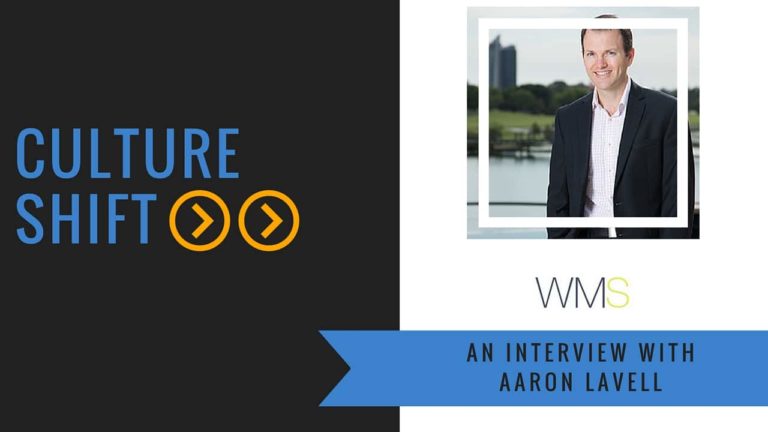Today, we sat down with Aaron Lavell, Managing Director with WMS Chartered Accountants, to speak about the shift in workplace culture which led to the creation of WMS, and their fantastic culture growth which has seen them grow to be one of the Gold Coast’s largest professional firms.
.
Aaron tells us why principles matter in business planning – and what impact that has on retaining the best talent.
J: Give us a bit of an overview of WMS and how you came to be…
A: We started in May 1994. 2 partners and 5 staff left a Big 4 accounting firm at the same time after an extended down turn period emanating from the “Recession we had to have”. The “W” and “M” stand for the surnames of the founding partners and the “S” stands for Staff. From day 1, the staff have been recognised as the core ingredient of what the firm is about.
.
J: What led you to embark on formally developing your culture?
A: Day 1 was easy. We simply looked at where we had come from and assessed the merits of doing the opposite. That isn’t intended to be a criticism per se of the former firm, it was just a result of an extended down turn and their former policies around transparency in numbers and decision making processes. For example at WMS for over a decade, we were totally open book and staff set their own salaries. As the firm grew we found it harder to keep everyone on the same page and certain newer staff didn’t appreciate the history and the fragile nature of a true open book approach. We found staff making ambit claims for pay rises expecting to be shaved back. In the first 5 years of operations, not one pay rise was knocked back, because the requests were fair.
Around 2006 we implemented the “WMS Culture Wheel”. This was 10 core cultural concepts usually expressed as one word. We received immediate positive impact with same. A true test of any culture is hard times, with the onset of the GFC we found that some of the one word concepts could be interpreted in different ways and some were aspirational. As an example, our final concept was “Fairness” which was the outline of the wheel and designed to be a tie breaker provision. What is “Fair” can vary depending on your perspective. So with that by way of background, in 2014, we embarked on a fresh approach trying to keep the genesis of the firm’s origins whilst introducing an explanatory framework for each core principle. It coincided with a brand and web site refresh.
.
J: Can you give us an overview of the process?
A: We grabbed our 6 partners and a range of 6 staff. By range, we covered from our next partner in waiting to the leader of our Secretarial team. We were facilitated by someone external and we had regular break out groups of 3 armed with butcher’s paper to brain storm concepts and associated explanation. We had decided to include 3 to 5 core principles with about 3 explanatory lines per principle. This was designed to address the ambiguous nature of the original one word concepts. By day’s end we had a draft list of 5. We met again internally the following week and then again the week later with the entire office (approximately 50). During that workshop, which was again facilitated by the same external party, we updated the proposed imagery for the core principles to go onto our new website. We workshopped on a Friday afternoon and the website went live on Monday. This gave us bang for our buck internally and also drew attention to it for visitors to our new website.
.
J: How did the team engage/react to the process/outcome?
A: You could feel the energy in the room which was great to be part of. As it was designed in-house, we all had ownership of it.
.
J: What have been the benefits of the process?
A: Straight up, it gave us to have a focused above the line discussion as a group as to “what type of work place would you want to come to everyday?”. You then assessed each principle as to whether we as a group were prepared to commit to live and breathe it in both good and bad times. We have a go to framework to assess any key decision facing the firm.
.
J: How do you keep it alive?
A: It has to come into your daily vernacular. As an example, every email our HR manager sends contains a footer with some different play on words of one of the principles. We filled an entire wall of our main break out area with graphics of the 5 principles. Our screen savers are a rotation of the core principles. We had about a dozen of the staff do a culture video which sits on our website. The framework was allocated in terms of what principle each team member would cover, but what they said was completely unscripted. We wanted it to be real and the only way to do that was to have it come from the coal face.
.
J: What are some of the setbacks or pitfalls you’ve experienced around developing your culture?
A: We adopted two broad approaches pre the present framework. Both were entirely appropriate for the firm at that stage of the firm’s evolution, however, for broad reasons outlined above, they both ran their course.
.
J: How has it impacted your ability to attract or retain talent?
A: Huge impact. 99% of applicants make reference to the culture video on the website and the initial perception of what it is like to work here is very high. Our challenge of course is to provide the tools and environment to enable the reality to match the brochure.
.
J: How has it impacted performance and happiness of the team?
A: Our last financial year results were great. The staff turnover here has always been good compared to industry standard but has further been enhanced. I think the staff trust the culture and we encourage them to “shoot straight” if they feel we have slipped up as a partner group. We all work hard and deadlines can stretch the odd friendship, however the group get along very well because we have a common goal to understand our client’s business and make a difference to their lives.
.
J: How did you get all leaders aligned to buy into the process?
A: That was easy, as our own observations combined with our 360 degree reviews told us the old Culture Wheel had run its race. When you get that feedback, you ignore it at your own peril. None of our partner group are perfect, but we all understand that if you don’t have the foundation right, anything you try and build on it will be fragile.
[divider line_type=”Full Width Line” custom_height=”20″]
[two_thirds]Aaron Lavell is the firms Managing Partner, and has over 20 years experience in the accounting industry with his initial years at Ernst & Young, before commencing as a founding member of WMS.
.
Aaron has a strong focus in the property sector and heads the firm’s Corporate Finance Team, which holds and AFSL
For more about Aaron, click HERE.

Striking a Chord with Success: The Steve Vai Theory Merging Skill & Creativity in Perfect Harmony
Master the Basics, and Innovate Like a Rockstar!




